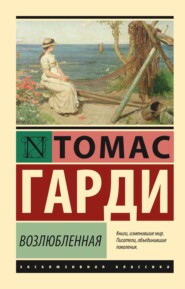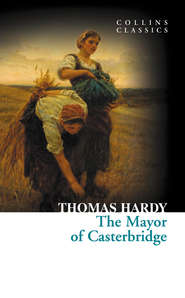По всем вопросам обращайтесь на: info@litportal.ru
(©) 2003-2025.
✖
Far From the Madding Crowd
Настройки чтения
Размер шрифта
Высота строк
Поля
His incipient friendship with her aunt had been nipped by the failure of his suit, and all that Oak learnt of Bathsheba’s movements was done indirectly. It appeared that she had gone to a place called Weatherbury, more than twenty miles off, but in what capacity – whether as a visitor or permanently, he could not discover.
Gabriel had two dogs. George, the elder, exhibited an ebony-tipped nose, surrounded by a narrow margin of pink flesh, and a coat marked in random splotches approximating in colour to white and slaty grey; but the grey, after years of sun and rain, had been scorched and washed out of the more prominent locks, leaving them of a reddish-brown, as if the blue component of the grey had faded, like the indigo from the same kind of colour in Turner’s pictures. In substance it had originally been hair, but long contact with sheep seemed to be turning it by degrees into wool of a poor quality and staple.
This dog had originally belonged to a shepherd of inferior morals and dreadful temper, and the result was that George knew the exact degrees of condemnation signified by cursing and swearing of all descriptions better than the wickedest old man in the neigh-bourhood. Long experience had so precisely taught the animal the difference between such exclamations as ‘Come in!’ and ‘D— ye, come in!’ that he knew to a hair’s breadth the rate of trotting back from the ewes’ tails that each call involved, if a staggerer with the sheep-crook was to be escaped. Though old, he was clever and trustworthy still.
The young dog, George’s son, might possibly have been the image of his mother, for there was not much resemblance between him and George. He was learning the sheep-keeping business, so as to follow on at the flock when the other should die, but had got no further than the rudiments as yet – still finding an insuperable difficulty in distinguishing between doing a thing well enough and doing it too well. So earnest and yet so wrong-headed was this young dog (he had no name in particular, and answered with perfect readiness to any pleasant interjection) that if sent behind the flock to help them on he did it so thoroughly that he would have chased them across the whole county with the greatest pleasure if not called off, or reminded when to stop by the example of old George.
Thus much for the dogs. On the further side of Norcombe Hill was a chalk-pit, from which chalk had been drawn for generations, and spread over adjacent farms. Two hedges converged upon it in the form of a V, but without quite meeting. The narrow opening left, which was immediately over the brow of the pit, was protected by a rough railing.
One night, when Farmer Oak had returned to his house, believing there would be no further necessity for his attendance on the down, he called as usual to the dogs, previously to shutting them up in the outhouse till next morning. Only one responded – old George; the other could not be found, either in the house, lane, or garden. Gabriel then remembered that he had left the two dogs on the hill eating a dead lamb (a kind of meat he usually kept from them, except when other food ran short), and concluding that the young one had not finished his meal he went indoors to the luxury of a bed, which latterly he had only enjoyed on Sundays.
It was a still, moist night. Just before dawn he was assisted in waking by the abnormal reverberation of familiar music. To the shepherd, the note of the sheep-bell, like the ticking of the clock to other people, is a chronic sound that only makes itself noticed by ceasing or altering in some unusual manner from the well-known idle tinkle which signifies to the accustomed ear, however distant, that all is well in the fold. In the solemn calm of the awakening morn that note was heard by Gabriel, beating with unusual violence and rapidity. This exceptional ringing may be caused in two ways – by the rapid feeding of the sheep bearing the bell, as when the flock breaks into new pasture, which gives it an intermittent rapidity, or by the sheep starting off in a run, when the sound has a regular palpitation. The experienced ear of Oak knew the sound he now heard to be caused by the running of the flock with great velocity.
He jumped out of bed, dressed, tore down the lane through a foggy dawn, and ascended the hill. The forward ewes were kept apart from those among which the fall of lambs would be later, there being two hundred of the latter class in Gabriel’s flock. These two hundred seemed to have absolutely vanished from the hill. There were the fifty with their lambs, enclosed at the other end as he had left them, but the rest, forming the bulk of the flock, were nowhere. Gabriel called at the top of his voice the shepherd’s call:
‘Ovey, ovey, ovey!’
Not a single bleat. He went to the hedge; a gap had been broken through it, and in the gap were the footprints of the sheep. Rather surprised to find them break fence at this season, yet putting it down instantly to their great fondness for ivy in winter-time, of which a great deal grew in the plantation, he followed through the hedge. They were not in the plantation. He called again: the valleys and furthest hills resounded as when the sailors invoked the lost Hylas on the Mysian shore; but no sheep. He passed through the trees and along the ridge of the hill. On the extreme summit, where the ends of the two converging hedges of which we have spoken were stopped short by meeting the brow of the chalk-pit, he saw the younger dog standing against the sky – dark and motionless as Napoleon at St Helena.
A horrible conviction darted through Oak. With a sensation of bodily faintness he advanced: at one point the rails were broken through, and there he saw the footprints of his ewes. The dog came up, licked his hand, and made signs implying that he expected some great reward for signal services rendered. Oak looked over the precipice. The ewes lay dead and dying at its foot – a heap of two hundred mangled carcases, representing in their condition just now at least two hundred more.
Oak was an intensely humane man: indeed, his humanity often tore in pieces any politic intentions of his which bordered on strategy, and carried him on as by gravitation. A shadow in his life had always been that his flock ended in mutton – that a day came and found every shepherd an arrant traitor to his defenceless sheep. His first feeling now was one of pity for the untimely fate of these gentle ewes and their unborn lambs.
It was a second to remember another phase of the matter. The sheep were not insured. All the savings of a frugal life had been dispersed at a blow; his hopes of being an independent farmer were laid low – possibly for ever. Gabriel’s energies, patience, and industry had been so severely taxed during the years of his life between eighteen and eight-and-twenty, to reach his present stage of progress, that no more seemed to be left in him. He leant down upon a rail, and covered his face with his hands.
Stupors, however, do not last for ever, and Farmer Oak recovered from his. It was as remarkable as it was characteristic that the one sentence he uttered was in thankfulness: –
‘Thank God I am not married: what would she have done in the poverty now coming upon me!’
Oak raised his head, and wondering what he could do, list-lessly surveyed the scene. By the outer margin of the pit was an oval pond, and over it hung the attenuated skeleton of a chrome-yellow moon, which had only a few days to last – the morning star dogging her on the left hand. The pool glittered like a dead man’s eye, and as the world awoke a breeze blew, shaking and elongating the reflection of the moon without breaking it, and turning the image of the star to a phosphoric streak upon the water. All this Oak saw and remembered.
As far as could be learnt it appeared that the poor young dog, still under the impression that since he was kept for running after sheep, the more he ran after them the better, had at the end of his meal off the dead lamb, which may have given him additional energy and spirits, collected all the ewes into a corner, driven the timid creatures through the hedge, across the upper field, and by main force of worrying had given them momentum enough to break down a portion of the rotten railing, and so hurled them over the edge.
George’s son had done his work so thoroughly that he was considered too good a workman to live, and was, in fact, taken and tragically shot at twelve o’clock that same day – another instance of the untoward fate which so often attends dogs and other philosophers who follow out a train of reasoning to its logical conclusion, and attempt perfectly consistent conduct in a world made up so largely of compromise.
Gabriel’s farm had been stocked by a dealer – on the strength of Oak’s promising look and character – who was receiving a percentage from the farmer till such time as the advance should be cleared off. Oak found that the value of stock, plant, and implements which were really his own would be about sufficient to pay his debts, leaving himself a free man with the clothes he stood up in, and nothing more.
Chapter 6
The fair – The journey – The fire
Two months passed away. We are brought on to a day in February, on which was held the yearly statute or hiring fair in the county-town of Casterbridge.
At one end of the street stood from two to three hundred blithe and hearty labourers waiting upon Chance – all men of the stamp to whom labour suggests nothing worse than a wrestle with gravitation, and pleasure nothing better than a renunciation of the same. Among these, carters and waggoners were distinguished by having a piece of whip-cord twisted round their hats; thatchers wore a fragment of woven straw; shepherds held their sheep-crooks in their hands; and thus the situation required was known to the hirers at a glance.
In the crowd was an athletic young fellow of somewhat superior appearance to the rest – in fact, his superiority was marked enough to lead several ruddy peasants standing by to speak to him inquiringly, as to a farmer, and to use ‘Sir’ as a finishing word. His answer always was, – ‘I am looking for a place myself – a bailiffs. Do ye know of anybody who wants one?’
Gabriel was paler now. His eyes were more meditative, and his expression was more sad. He had passed through an ordeal of wretchedness which had given him more than it had taken away. He had sunk from his modest elevation as pastoral king into the very slime-pits of Siddim; but there was left to him a dignified calm he had never before known, and that indifference to fate which, though it often makes a villain of a man, is the basis of his sublimity when it does not. And thus the abasement had been exaltation, and the loss gain.
In the morning a regiment of cavalry had left the town, and a sergeant and his party had been beating up for recruits through the four streets. As the end of the day drew on, and he found himself not hired, Gabriel almost wished that he had joined them, and gone off to serve his country. Weary of standing in the market-place, and not much minding the kind of work he turned his hand to, he decided to offer himself in some other capacity than that of bailiff.
All the farmers seemed to be wanting shepherds. Sheep-tending was Gabriel’s speciality. Turning down an obscure street and entering an obscurer lane, he went up to a smith’s shop.
‘How long would it take you to make a shepherd’s crook?’
‘Twenty minutes.’
‘How much?’
‘Two shillings.’
He sat on a bench and the crook was made, a stem being given him into the bargain.
He then went to a ready-made clothes shop, the owner of which had a large rural connection. As the crook had absorbed most of Gabriel’s money, he attempted, and carried out, an exchange of his overcoat for a shepherd’s regulation smock-frock.
This transaction having been completed he again hurried off to the centre of the town, and stood on the kerb of the pavement, as a shepherd, crook in hand.
Now that Oak had turned himself into a shepherd it seemed that bailiffs were most in demand. However, two or three farmers noticed him and drew near. Dialogues followed, more or less in the subjoined form: –
‘Where do you come from?’
‘Norcombe.’
‘That’s a long way.’
‘Fifteen miles.’
‘Whose farm were you on last?’
‘My own.’
This reply invariably operated like a rumour of cholera. The inquiring farmer would edge away and shake his head dubiously. Gabriel, like his dog, was too good to be trustworthy, and he never made advance beyond this point.
It is safer to accept any chance that offers itself, and extemporize a procedure to fit it, than to get a good plan matured, and wait for a chance of using it. Gabriel wished he had not nailed up his colours as a shepherd, but had laid himself out for anything in the whole cycle of labour that was required in the fair. It grew dusk. Some merry men were whistling and singing by the corn-exchange. Gabriel’s hand, which had lain for some time idle in his smock-frock pocket, touched his flute, which he carried there. Here was an opportunity for putting his dearly bought wisdom into practice.
He drew out his flute and began to play ‘Jockey to the Fair’ in the style of a man who had never known a moment’s sorrow. Oak could pipe with Arcadian sweetness, and the sound of the well-known notes cheered his own heart as well as those of the loungers. He played on with spirit, and in half an hour had earned in pence what was a small fortune to a destitute man.
By making inquiries he learnt that there was another fair at Shottsford the next day.
‘How far is Shottsford?’
‘Ten miles t’other side of Weatherbury.’
Weatherbury! It was where Bathsheba had gone two months before. This information was like coming from night into noon.
‘How far is it to Weatherbury?’
‘Five or six miles.’

















